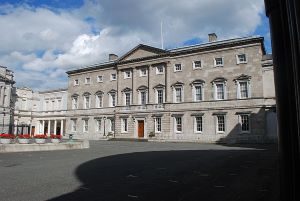Constantine Cannon’s London Office Provides Response to Ireland’s Request for Consultation on the Transposition of the EU Whistleblowing Directive

Members of the Constantine Cannon London whistleblower team, Mary Inman, Carolina González, and Alicja Dijakiewicz-Kocon, recently prepared and submitted a response to the Irish government’s request for public consultation on the transposition of the new EU Whistleblowing Directive. The Directive, which must be transposed into the national laws of EU Member States by 2021, establishes a common minimum standard for the protection of whistleblowers. Member States are free, however, to go above and beyond that floor, exploring different options and enacting additional protections.
For instance, while the Directive’s scope is limited to individuals who report information on threats or harm to the public interest obtained in the context of their work-related activities, Member States are free to expand on this definition and afford wider legal protections to whistleblowers who obtain information from other sources or who inform on different matters, such as national security. It is in such discretionary areas that the Irish government has sought input from the public and on which Constantine Cannon has provided guidance.
Ireland is one of ten EU Member States that already has a robust whistleblower protection law on its books. Ireland’s Protected Disclosures Act of 2014 allows individuals to report on wrongdoing in Ireland or elsewhere, whether internally, externally or to journalists or public representatives. Employees who report, and persons associated with them, are protected from any detriment related to the disclosure, including dismissal, unfair treatment, bullying and harassment. Whistleblowers are further protected from both civil and criminal liability with respect to the disclosure of confidential information. As with all legislation, in the six years since its adoption, experts have noted areas in which Ireland’s Protected Disclosures Act has room to improve.
Our team submitted a response and supplemental letter to the ten questions Ireland’s Department of Public Expenditure and Reform posed, in which we urge Ireland to establish more effective channels for internal and external reporting and cited, by way of example, work by the UK’s All Party Parliamentary Group (APPG) on Whistleblowing, members of which recently introduced legislation to create an Office of the Whistleblower within UK government that provides a central clearing house for whistleblowers and is tasked with providing financial redress and support to whistleblowers who have suffered a loss of employment or other damage as a result of their disclosures and to ensure that those whistleblowers’ disclosures are acted upon by the appropriate government departments and/or regulatory agencies.
Also included in our response and supplemental letter is a call for Ireland to expand its conception of whistleblower protections to include whistleblower programs like those that have been so successful in the US and Canada, such as the US Securities and Exchange Commission (SEC) whistleblower program, created 10 years ago this month under the Dodd-Frank Wall Street Reform Act, which include financial incentives for whistleblowers and allow whistleblowers to make their disclosures anonymously.
We congratulate Mary, Carolina and Alicja on this effort and look forward to continued collaborations with Ireland and other EU Member States as they seek to transpose the Whistleblowing Directive into national law by the 2021 deadline and consider expanded whistleblower protections and tools.
Read More:
- International Whistleblowers
- It’s Live: Constantine Cannon’s EU Whistleblower Directive Transposition Guide
- New EU Rules Give Protection to Whistleblowers
- The Constantine Cannon Whistleblower Team
- Whistleblower FAQs
- Contact us for a confidential consultation
Tagged in: CC Lawyers, Importance of Whistleblowers, International Whistleblowers, Legislation and Regulation News,